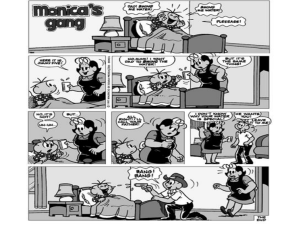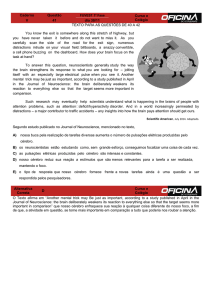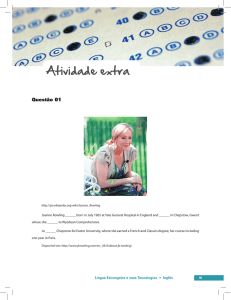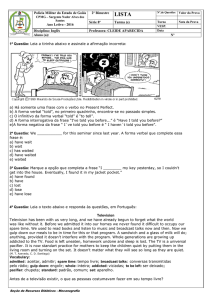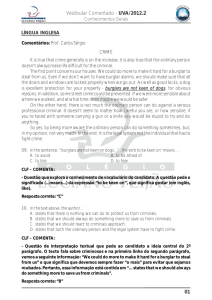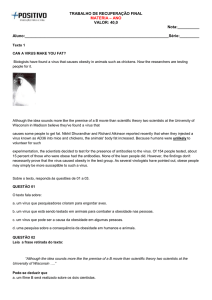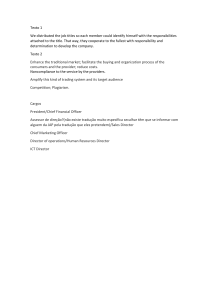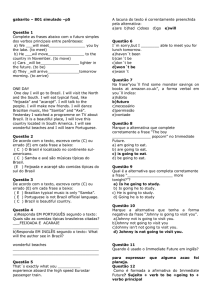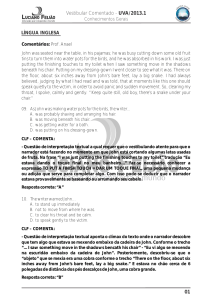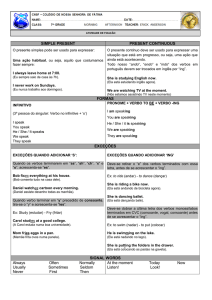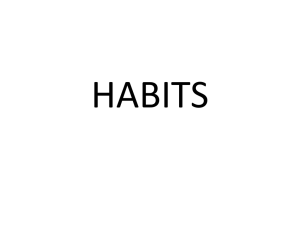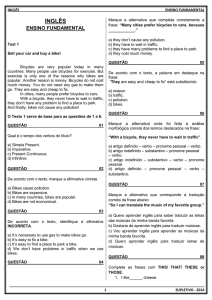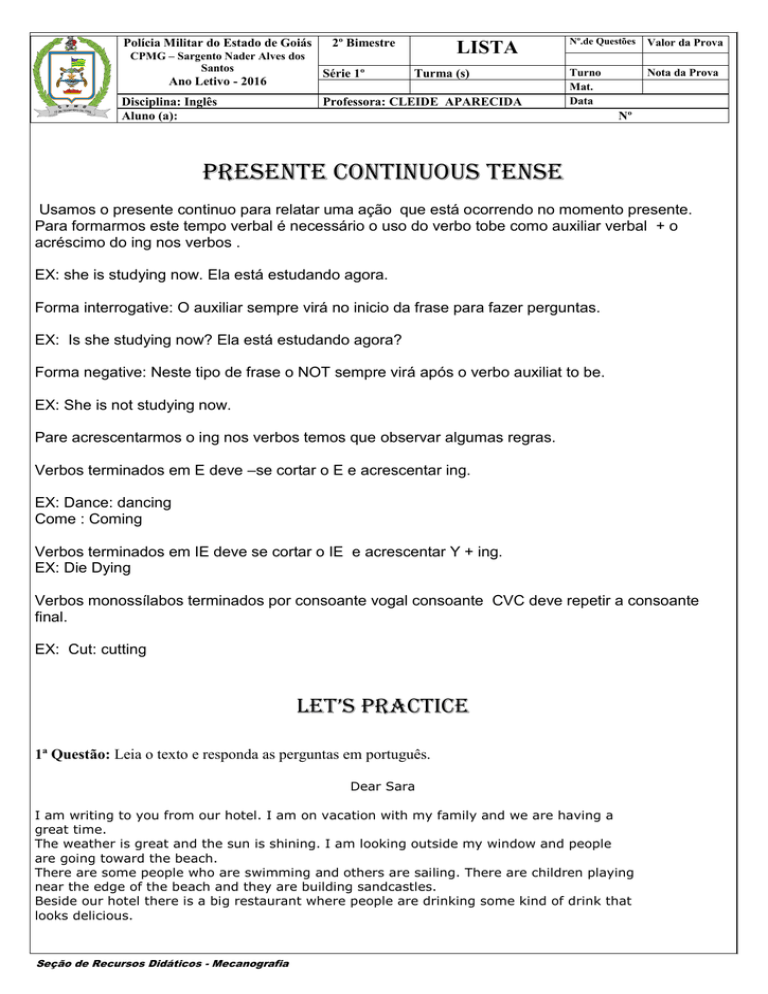
Polícia Militar do Estado de Goiás
CPMG – Sargento Nader Alves dos
Santos
Ano Letivo - 2016
Disciplina: Inglês
Aluno (a):
2º Bimestre
Série 1º
LISTA
Turma (s)
Professora: CLEIDE APARECIDA
Nº.de Questões
Valor da Prova
Turno
Mat.
Data
Nota da Prova
Nº
Presente continuous tense
Usamos o presente continuo para relatar uma ação que está ocorrendo no momento presente.
Para formarmos este tempo verbal é necessário o uso do verbo tobe como auxiliar verbal + o
acréscimo do ing nos verbos .
EX: she is studying now. Ela está estudando agora.
Forma interrogative: O auxiliar sempre virá no inicio da frase para fazer perguntas.
EX: Is she studying now? Ela está estudando agora?
Forma negative: Neste tipo de frase o NOT sempre virá após o verbo auxiliat to be.
EX: She is not studying now.
Pare acrescentarmos o ing nos verbos temos que observar algumas regras.
Verbos terminados em E deve –se cortar o E e acrescentar ing.
EX: Dance: dancing
Come : Coming
Verbos terminados em IE deve se cortar o IE e acrescentar Y + ing.
EX: Die Dying
Verbos monossílabos terminados por consoante vogal consoante CVC deve repetir a consoante
final.
EX: Cut: cutting
LET’S PRACTICE
1ª Questão: Leia o texto e responda as perguntas em português.
Dear Sara
I am writing to you from our hotel. I am on vacation with my family and we are having a
great time.
The weather is great and the sun is shining. I am looking outside my window and people
are going toward the beach.
There are some people who are swimming and others are sailing. There are children playing
near the edge of the beach and they are building sandcastles.
Beside our hotel there is a big restaurant where people are drinking some kind of drink that
looks delicious.
Seção de Recursos Didáticos - Mecanografia
At the moment my brother is watching television and my mother is telling him to get ready
because we are going to do some sightseeing.
My father is waiting for us downstairs, so I will write to you again later in the week. I have
to go now.
Love, Paula.
Vocabulary: great: ótimo; to shine: brilhar; toward: em direção a; edge: beira; to build: construir, sandcastles: castelos
de areia; to get ready: ficar pronto; to tell: dizer; sightseeing: passeio turístico; to wait: esperar; downstairs: no térreo.
Após ter lido o texto, responda às perguntas em português:
a) Onde está Paula?
______________________________________________________________________________
b) Como está o tempo?
______________________________________________________________________________
c) O que Paula está fazendo neste momento?
______________________________________________________________________________
d) Onde o restaurante está localizado?
______________________________________________________________________________
e) O que o irmão de Paula está fazendo?
______________________________________________________________________________
2ª Questão: Leia as afirmações abaixo e decida se são verdadeiras ou falsas:
I) People are swimming and dancing.
II) Paulo and his family are on vacation.
III) The hotel is near the beach.
IV) The weather isn’t very good.
a) F – V – V – F
b) V – V – V – V
c) F – V – F – V
d) V – F – V – F
e) V – V – V – F
3ª Questão: Para formar o gerúndio em inglês, acrescenta-se a terminação ING no final dos
verbos, porém há algumas regras e exceções. Marque a alternativa que tenha todos os verbos na
forma correta do gerúndio.
a) to play – playing / to love – loving / to stop – stopping / to agree – agreeing
b) to play – plaing / to love – loveing / to stop – stoping / to agree – agreeing
c) to play – plaing / to love – loving / to stop – stopping / to agree – agreing
d) to play – playing / to love – loving / to stop – stoping / to agree – agring
e) to play – playing / to love – loveing / to stop – stoping / to agree – agreing
4ª QuestãoQuanto ao estudo do Present Continuous, marque a alternativa que tenha a forma.
correta de uma frase nesse tempo verbal:
a) Paul is work in the garden at this moment.
b) Paul is working in the garden at this moment.
c) Paul working in the garden at this moment.
d) Paul are working in the garden at this moment.
e) Paul are work in the garden at this moment.
5ª Questão: Substitua os nomes abaixo por pronomes pessoais ( SUBJECT PRONOUN ) ( 0,5 )
a) The dog is in the house.
_____________________________________________________
b) Bob and Jack are in the kitchen.
_____________________________________________________
c) july and I are good friends.
______________________________________________________
d) My teachers are preparing the class.
______________________________________________________
e) Maria is a good doctor.
_______________________________________________________
Seção de Recursos Didáticos - Mecanografia
6ª Questão: Marque a alternativa que complete corretamente as frases a seguir no Present
Continuous:
I – The woman ________ (to wear) black clothes.
II – Those boys ____________ (to look) at you.
a) wearing / looking
b) is wear / are look
c) are wearing / is looking
d) is wearing / are looking
e) is wearing / is looking
7ª Questão: Escreva as frases abaixo na negativa e na interrogativa.
a) Angela is cleaning the bedroom.
Neg.: ___________________________________________________________
Int.: ____________________________________________________________
b) David and Max are coming home.
Neg.: ___________________________________________________________
Int.: ____________________________________________________________
c) My dog Charlie is running to the park.
Neg.: ___________________________________________________________
Int.: ____________________________________________________________
8ª Questão: Qual é a tradução da frase “They are working at the computer now”?
a) Eles sempre trabalham no computador.
b) Eles trabalharam no computador ontem.
c) Eles estão trabalhando no computador agora.
d) Eles irão trabalhar no computador amanhã.
e) Ele está trabalhando no computador agora
9ª Questão: Leia o diálogo e faça as questões 10 e 11.
Survey
Mark: Good morning Mrs. I’m making a survey about couple life. So, would you like to answer
some questions about the subject, please?
Ally: Yes, with great pleasure.
Mark: Thank you for taking the time. Now, first of all: What do you do?
Ally: I work in a library. I'm a librarian.
Mark: Are you married?
Ally: Yes, I am.
Mark: What does your husband do?
Ally: He works as a policeman.
Mark: Do you usually have dinner together?
Ally: Yes, we do.
Mark: How often does your husband exercise?
Ally: He sometimes exercises four times a week. But, he usually exercises only twice a week.
Mark: Where do you like going on holiday?
Ally: We rarely go on holiday. However, we like going to the mountains if we can.
Mark: What type of books do you read?
Ally: I often read horror stories.
Mark: Thank you very much for answering my questions.
Ally: You're welcome!
Vocabulary: survey: pesquisa; couple: casal; subject: assunto; married: casado (a); to have
dinner: jantar; Holiday: ferias; usually: geralmente.
10ª Questão: Marque a alternativa incorreta:
a) O pronome He, sublinhado no texto, se refere ao marido de Ally.
b) O pronome We, destacado no texto, se refere a Ally e seu marido.
c) Ally is a woman.
d) Ally usually has dinner with her husband.
e) Ally often reads romantic stories.
Seção de Recursos Didáticos - Mecanografia
11ª Questão: De acordo com o texto, qual das afirmações é incorreta?
a) Ally é casada.
b) Ally trabalha em uma biblioteca.
c) O marido de Ally é um policial.
d) O casal sempre janta junto.
e) Ally e o marido gostam de ir à praia nas férias.
12ª Questão: Qual é a forma interrogativa da frase “The cat is running around the table”?
a) Running the cat is around the table?
b) Is the cat running around the table
c) The is cat running around the table?
d) The cat is running around the table?
E) The cat running around the table?
13ª Questão: Neste exercício você terá que responder o que o personagem da ilustração está
fazendo. Veja o exemplo:
What is he doing? He is playing soccer.
What is he doing? (to drink – a cup of tea)
_________________________________________
is he doing? (to eat – a sandwich)
_________________________________________
What are they doing? (to sing)
_________________________________________
What is he doing? (to cook – the meal)
_________________________________________
Seção de Recursos Didáticos - Mecanografia
Seção de Recursos Didáticos - Mecanografia

